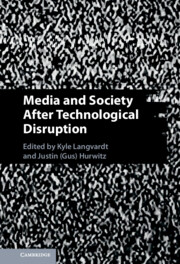Media and Society After Technological Disruption
The internet has reshaped the media landscape and the social institutions built upon it. Competition from online media sources has decimated local journalism and diminished the twentieth century’s established journalistic gatekeepers. Social media puts individual users front and center in the creation of the content that they consume. Harmful speech can spread further and faster, and the institutions responsible for policing that speech – Facebook, TikTok, YouTube, and the like – lack any clear twentieth-century analog. The law is still working to catch up to the world these changes have wrought.
This volume gathers sixteen scholars in law, media, technology, and history to consider these changes. Chapters explore the breakdown of trust in the media, changes in the law of defamation and privacy, challenges of online content moderation, and financial viability for journalistic enterprises in the internet age. This title is also available as Open Access on Cambridge Core.
Kyle Langvardt is an Assistant Professor of Law at the University of Nebraska College of Law. He has written extensively on technology regulation and the First Amendment, with a special focus on issues relating to content moderation and consumer protection.
Gus Hurwitz is Senior Fellow and Academic Director of the Center for Technology, Innovation, and Competition at the University of Pennsylvania. He is also the Director of Law & Economics Programs at the International Center for Law & Economics, and was previously a professor of law and founding director of the Governance & Technology Center at the University of Nebraska. His teaching and research blends law, technology, and business to study the benefits of costs and technological change.

